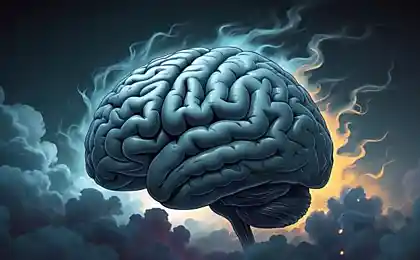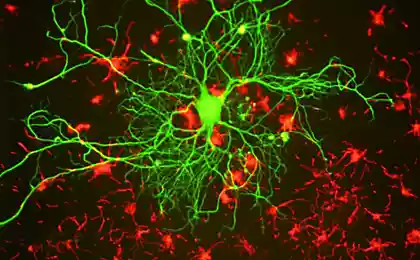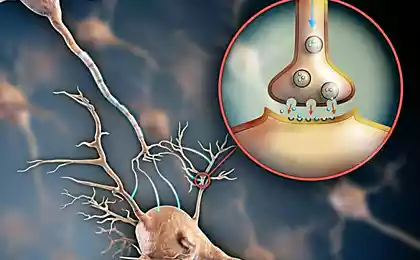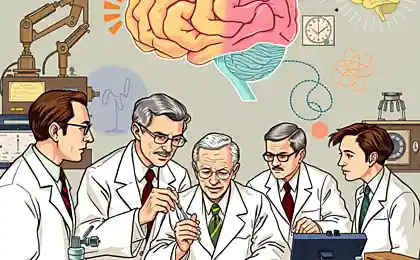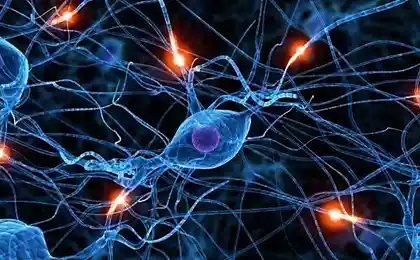818
5 most delusional myths about the brain in which everyone believes, but in vain
The brain - is the sort of thing that everyone is interested in, but which is not so easy to understand because of the huge number of myths. The site offers a walk through the most obvious of them, most people still believe.
1. "The emotions interfere with rational decision-making" Pop culture is full of brilliant characters whose primary ability is to not let sentiment get in the way logic. Sherlock Holmes, Dr. House, Spock - they are not able to experience complex emotions, such as love, and all of them - the great geniuses, because they can not feel. In the end, emotion only clouded thinking, right ?

Actually ...
Emotions and rational decision making are best friends. Removing emotion from the equation actually completely destroy our ability to make decisions.
Mind uses emotions to lead us to the right decision: awesome options come with fear and negative emotions, while the solutions that our brain is considered the best, come enveloped in a tiny cloud of happiness. The whole system is functioning harmoniously, and it is one inseparable from the other.
2. "I guess I'm just not a mathematician!" Some people are tall, others short. Some of us created for mathematics, while others see themselves as humanitarians. In the end, is the stereotype that "Asians - great mathematicians", confirmed by statistics, is not true?

Actually ...
It is true that a certain percentage of our intellect is related to genetics (as it is almost impossible to estimate, and this fierce controversy), but there is no "mathematical part of the brain». Asian countries excelled in mathematics because that their culture cultivates this property.
So, you want to know the secret of possessing abilities in mathematics? It is a practice, just like any other skill. Most people do not do well in math, for the simple reason that "do not see themselves as mathematicians." This psychological feature is called "fixed mindset" and acts as a kind of self-hypnosis.
It should be as soon as possible to tell the children that mathematics - it acquired skill, not a talent. And if they get it right at the beginning, then usually do well in this area.

Edward Witten
3. "Games for brain training will make you smarter!" Game to train your brain, so-called "Brain games" help fun and interesting to spend time together to "pump" memory or cognitive abilities ... at least, so says advertising.

Actually ...
It turns out that the game for the brain does not have any effect on it: they can be fun to play, but in the end despite all the promises you will get zero beneficial effect.
Most studies claim that brain training games to actually do what they advertise, they are honest enough. To prove it, the company Bi-bi-si has forced 11 430 people to play educational games for the brain within six weeks. According to the study (as is usually the case when you practice something six full weeks), their gaming performance greatly improved. However, the snag was that after the six weeks, the subjects taking the real generalized intelligence tests were not able to apply the knowledge they gained during the game. So, as you can guess, the brain training did not do anyone smarter.
4. "Omega-3 - the perfect food for the brain!" Omega-3 is credited with many useful functions: increasing the volume of your brain to improve your memory. So why do not we eat tons of fish oil to improve memory?

Actually ...
There is no reliable evidence that omega-3 fatty acids do anything for our thinking abilities.
The idea that omega-3 fatty acids are "brain food," came from the fact that our brains already contain a lot of fatty acids. Using the time-tested method of "you are what you eat", people believed that the more they use them, the more intelligent will. However, the none of the imagined benefits of consumption of omega-3 fatty acids has not been definitively proven. The studies were conducted, but none of these tests has not come to the published peer-reviewed document that we could recognize an important step in the process of determining scientific credibility.
So why are many professionals continue to insist that the Omega-3 is a very useful substance? We do not want to suggest anything to anyone, but let's still remember that omega-3 supplements - a multibillion-dollar business.
5. "One head is good, but two - better!" Apart from the fact that your boss does not like you, there's another reason why it makes you work regularly with people you hate: the more intellectual resources will be involved in project, the easier it will get good results.

Actually ...
Imagine a group of great minds working in a team. They have come together to launch the "brainstorming", allow to exchange ideas with each other and ultimately come up with SUPERID that will crush all competitors and will lead the company to success. In practice, usually works quite differently: due to cerebral phenomenon known as cognitive fixation, everyone in the group tend to focus on the ideas of others instead of their own. And while they are engaged in this, the idea that they themselves produce, as a rule, do not cost anything.
Then the brain is actively making everything worse, deceiving us and making to see things in a way that we believe any nonsense proposed by the group, even when these claims is fundamentally stupid and wrong. The brain is actually punishing us for expressing opinions minorities; every word, runs counter to the views of the group makes every cell of our body shaking with terror. So does our innate sociality.
Of course, in many cases, we have to work with others because they have the information and / or experience that are not yours. This paradox - the reason why our culture at the same time emphasizes teamwork («We can do anything, if we work together!») and individualism («You I would have jumped from the bridge just because all your friends do that? "). Should we go our own way or trust group?
Yeah, kind of amazing that we humans are generally able to do anything.
via www.cracked.com/article_21848_5-common-beliefs-about-your-brain-debunked-by-science.html
1. "The emotions interfere with rational decision-making" Pop culture is full of brilliant characters whose primary ability is to not let sentiment get in the way logic. Sherlock Holmes, Dr. House, Spock - they are not able to experience complex emotions, such as love, and all of them - the great geniuses, because they can not feel. In the end, emotion only clouded thinking, right ?

Actually ...
Emotions and rational decision making are best friends. Removing emotion from the equation actually completely destroy our ability to make decisions.
Mind uses emotions to lead us to the right decision: awesome options come with fear and negative emotions, while the solutions that our brain is considered the best, come enveloped in a tiny cloud of happiness. The whole system is functioning harmoniously, and it is one inseparable from the other.
2. "I guess I'm just not a mathematician!" Some people are tall, others short. Some of us created for mathematics, while others see themselves as humanitarians. In the end, is the stereotype that "Asians - great mathematicians", confirmed by statistics, is not true?

Actually ...
It is true that a certain percentage of our intellect is related to genetics (as it is almost impossible to estimate, and this fierce controversy), but there is no "mathematical part of the brain». Asian countries excelled in mathematics because that their culture cultivates this property.
So, you want to know the secret of possessing abilities in mathematics? It is a practice, just like any other skill. Most people do not do well in math, for the simple reason that "do not see themselves as mathematicians." This psychological feature is called "fixed mindset" and acts as a kind of self-hypnosis.
It should be as soon as possible to tell the children that mathematics - it acquired skill, not a talent. And if they get it right at the beginning, then usually do well in this area.

Edward Witten
3. "Games for brain training will make you smarter!" Game to train your brain, so-called "Brain games" help fun and interesting to spend time together to "pump" memory or cognitive abilities ... at least, so says advertising.

Actually ...
It turns out that the game for the brain does not have any effect on it: they can be fun to play, but in the end despite all the promises you will get zero beneficial effect.
Most studies claim that brain training games to actually do what they advertise, they are honest enough. To prove it, the company Bi-bi-si has forced 11 430 people to play educational games for the brain within six weeks. According to the study (as is usually the case when you practice something six full weeks), their gaming performance greatly improved. However, the snag was that after the six weeks, the subjects taking the real generalized intelligence tests were not able to apply the knowledge they gained during the game. So, as you can guess, the brain training did not do anyone smarter.
4. "Omega-3 - the perfect food for the brain!" Omega-3 is credited with many useful functions: increasing the volume of your brain to improve your memory. So why do not we eat tons of fish oil to improve memory?

Actually ...
There is no reliable evidence that omega-3 fatty acids do anything for our thinking abilities.
The idea that omega-3 fatty acids are "brain food," came from the fact that our brains already contain a lot of fatty acids. Using the time-tested method of "you are what you eat", people believed that the more they use them, the more intelligent will. However, the none of the imagined benefits of consumption of omega-3 fatty acids has not been definitively proven. The studies were conducted, but none of these tests has not come to the published peer-reviewed document that we could recognize an important step in the process of determining scientific credibility.
So why are many professionals continue to insist that the Omega-3 is a very useful substance? We do not want to suggest anything to anyone, but let's still remember that omega-3 supplements - a multibillion-dollar business.
5. "One head is good, but two - better!" Apart from the fact that your boss does not like you, there's another reason why it makes you work regularly with people you hate: the more intellectual resources will be involved in project, the easier it will get good results.

Actually ...
Imagine a group of great minds working in a team. They have come together to launch the "brainstorming", allow to exchange ideas with each other and ultimately come up with SUPERID that will crush all competitors and will lead the company to success. In practice, usually works quite differently: due to cerebral phenomenon known as cognitive fixation, everyone in the group tend to focus on the ideas of others instead of their own. And while they are engaged in this, the idea that they themselves produce, as a rule, do not cost anything.
Then the brain is actively making everything worse, deceiving us and making to see things in a way that we believe any nonsense proposed by the group, even when these claims is fundamentally stupid and wrong. The brain is actually punishing us for expressing opinions minorities; every word, runs counter to the views of the group makes every cell of our body shaking with terror. So does our innate sociality.
Of course, in many cases, we have to work with others because they have the information and / or experience that are not yours. This paradox - the reason why our culture at the same time emphasizes teamwork («We can do anything, if we work together!») and individualism («You I would have jumped from the bridge just because all your friends do that? "). Should we go our own way or trust group?
Yeah, kind of amazing that we humans are generally able to do anything.
via www.cracked.com/article_21848_5-common-beliefs-about-your-brain-debunked-by-science.html



